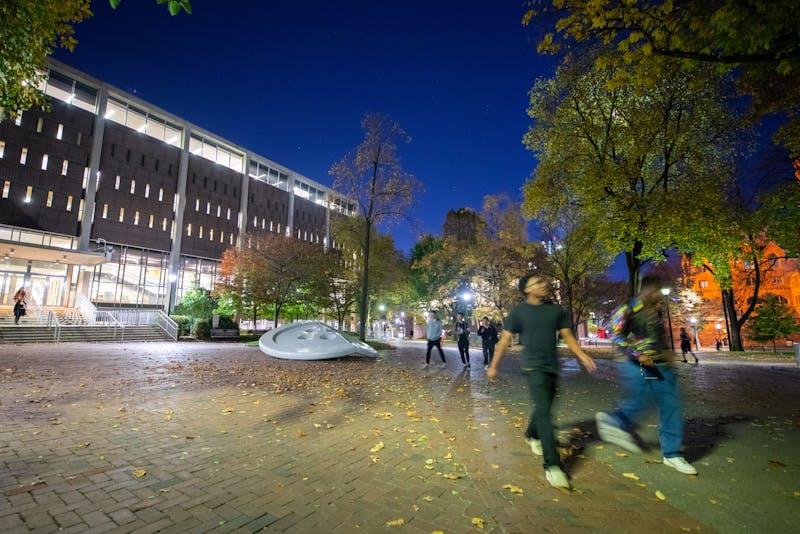
Upon returning home during winter break last year, I found myself shocked at the changes, albeit small, that occurred in my hometown: a popular chain store closed down, the nearby mall was renovated. It was all these little things that would have felt monumental had I still been living at home.
Slowly but surely, home was changing. And slowly but surely, I was destined to not return home as often. At what point would the place I spent nearly 18 years of my life living in be unrecognizable?
Moving from the small island where I spent my entire life to a state that's 9 times its size has certainly made the adjustment process more challenging. What has helped the most is having the privilege to be surrounded by people from my same birthplace; however, there were still some limitations in this regard. To my knowledge, there are broader communities at Penn within which I could see myself fitting in, but there is a lack of regional groups and clubs that could provide me true comfort far from home.
This environment, joined together with my future plans for graduate studies and post-graduate employment within the United States, led me to realize that the likelihood of returning home long-term has gotten smaller and smaller.
With this realization and a desire to procrastinate the work I had to do that day, I asked my roommate: if all our plans after graduation are carried out (implying we would not go back to our respective birthplaces for at least five years), would we feel a diminished sense of belonging upon our return?
This question spurred follow-ups: Would these returns be able to last for more than two weeks? How many years would pass until we don’t recognize our places of origin, or we ourselves aren’t recognized? How many years would pass until Philadelphia, and the broader U.S., would start to qualify more as our home?
These reflections startled me. I certainly wouldn’t lose all of my Puerto Rican cultural identity, but a divide would eventually occur. Upon growing increasingly worried and perplexed, I set out to speak to other students who were in similar situations.
I talked to Harsh Tibrewala, a College sophomore from Nepal, who before coming to Penn, went to a boarding school in India for six years. He plans to stay in the U.S. after graduation for at least 10 years but not in the long run. Thus far, he has returned home for every break. With upcoming research opportunities in the summer, the continuity of this tradition is threatened.
I asked him the question my roommate and I failed to answer: if, after a certain number of years, he would feel even slightly disconnected from his birthplace. He mentioned how there is no amount of years that would minimize his sense of belonging, but how, when talking to his family, his grandmother asked him “Are you my Harsh?”
Is there an inherent rift that arises upon staying in the U.S.?
Of course, there is a difference between not being able to return home and deciding to stay in the U.S.: here, I focus on the latter.
2022 Huntsman graduate Mariana Simoes underscored how, during COVID-19, she was unable to visit her home country Brazil for a year and a half. The pandemic completely eliminated the option to visit her home and family. This was an unfortunately common experience for many international students.
Beyond these situations, even for those fortunate enough to have the choice, there exists a multitude of external influences and pressures that may push us to decide to stay in the U.S.
Prior to Penn, Simoes always thought she was going to return to Brazil and become a diplomat. However, this path changed for her upon reaching campus, where she “gave up on being a diplomat” and “made peace with the fact that that wasn’t an option very early on.” Upon graduating, she went into investment banking for a year in New York. Mariana mentioned how Penn tends to influence and motivate us to go into the all-too-common consulting or investment banking careers.
In other words, she had to choose between a career that would be significantly rooted in her birth country or one of the few routes that would’ve allowed her “to maximize her chances of staying” in the U.S.
Does the University’s competitive environment and inclination for pre-professionalism push us away from career paths that would allow us to return to our birth countries more feasibly?
I also talked to Khalil ElBechir, a first year from Tunisia who aims to spend at least 15 years in the U.S. after graduating.
Although staying in the U.S. would maximize his employment opportunities, he believes it would negatively affect him to be that far from his family for an extended period of time. He already had to attend his mother’s retirement party online at 5 a.m. due to the time difference. He mentioned how he was updating his family on his life 24/7, but he was receiving no updates on theirs. ElBechir described how his first week at the University was incredibly hard, noting the lack of community for Tunisian students.
Even after these interviews, the original question I had posed had yet to be answered. Frankly, I do not need an answer. Cultural identity is something incredibly personal, and the effect that time spent away from one’s birth country has on said identity varies immensely from person to person. Despite the varying degrees of disconnect, however, the core connection to said birthplace remains.
Nevertheless, Penn’s environment seems to push us away from these roots, and there is an evident need for more formalized communities to help preserve the richly diverse international communities. Broader communities, such as one for all international students, are a step in the right direction yet still insufficient. We must establish regional communities that foment cultural connections, even if one is miles away from the place they call home.
BEATRIZ BÁEZ is a College sophomore studying mathematics and political science from San Juan, Puerto Rico. Her email is beabaez@sas.upenn.edu.
The Daily Pennsylvanian is an independent, student-run newspaper. Please consider making a donation to support the coverage that shapes the University. Your generosity ensures a future of strong journalism at Penn.
Donate











